Get A Quote
One of our team would be happy to have a chat with you about your requirements, answer any unanswered questions and measure up at a time that suits you to provide you a free, no obligation quote.
The right kitchen splashback instantly elevates your space with style, protection and easy cleaning. But with so many materials and design options, how do you choose?
This comprehensive guide covers everything about these versatile accent walls – from purpose and ideas to types, installation, Bespoke and budget buys. Read on to gain total splashback confidence!
As the high-traffic hub of the home, your kitchen deserves a splashback that’s as functional as it is beautiful. The area above countertops and appliances bears the brunt of cooking messes, water splashes, and daily wear and tear.
A proper splashback defends your wall while also serving as an opportunity to infuse personality into your culinary space. With the right know-how, you can easily design a kitchen splashback that excels in both form and function.
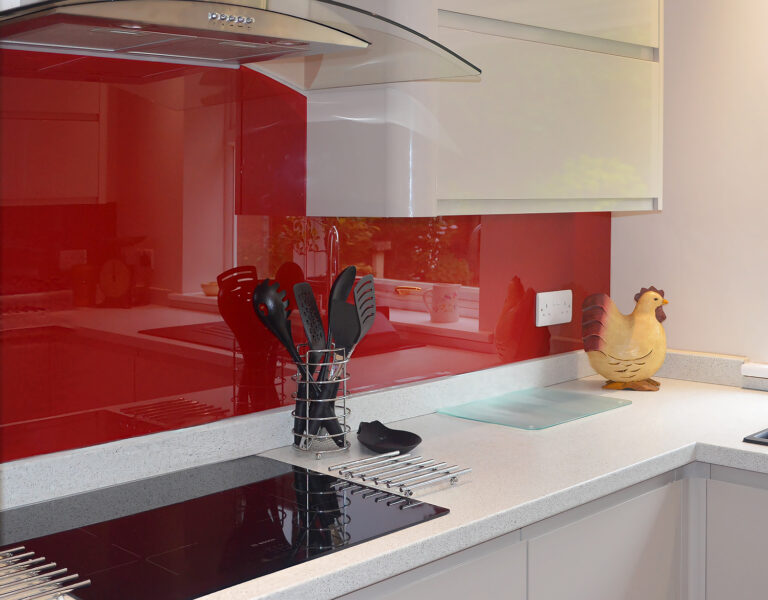
A kitchen splashback refers to a protective covering applied to the wall area behind sinks, stoves, and countertops prone to spills and splashes. Water-resistant materials like tile, glass or laminate prevent damage from moisture, grease, food and general use.
A related term is backsplash, which refers to solely the wall area behind a stove or worktop. Splashback is a broader term that can include the entire kitchen wall space.
– Guards wall from stains and water damage
– Adds an easy-to-clean and hygienic surface
– Provides decorative visual appeal
– Allows you room to exhibit personal style
– Freshens up a kitchen without full renovation
With the right material choice and design, kitchen splashbacks can be striking, low-maintenance, and budget-friendly.
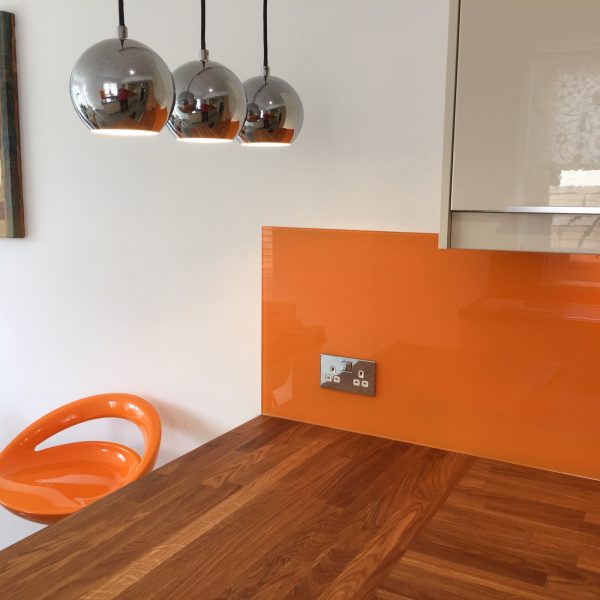
Ready for stylish splashback inspiration? Here are unique perfect splashback ideas to fuel your creativity:
– Mix and match complementary textures like subway tile with marble accents
– Use geometric or mosaic tiles to craft patterns like chevron and herringbone
– Paint the wall a bold accent colour to forgo tiles altogether
– Install open shelving atop a full wall metallic glass splashback
– Incorporate fun visual puns like fork or spoon graphics in the kitchen
– Accent solid tiles with decorative inserts, murals, or medallions
– Contrast glossy tiles with matte grout for added dimension
– Display collectibles like vintage plates or herb planters against the splashback
Let your personality shine through! The right splashback makes cooking and cleaning up more enjoyable.
With a vast range huge variety of materials available, how do you select the perfect match for your kitchen? Here are top options with their pros and cons:
Glass – Sleek and shiny, toughened glass splashbacks make a modern statement. Resists stains excellently and instals cleanly. Coloured glass splashbacks also compliment your kitchens design and mood.
Tile – Classic subway tile is versatile and affordable. Grout needs resealing. Many style and colour options available.
Stainless Steel – A commercial look for serious cooks. Super durable and sanitary. Shows fingerprints. Industrial vibe.
Plywood – Warm wood appearance without the maintenance. Budget-friendly. Polyurethane coats protect from moisture.
Laminate – Affordable and DIY-friendly. Wide range of patterns and colours. Clean with ease but scratches over time.
The optimal material comes down to your kitchen’s aesthetics, footprint, and budget. Talk to a designer to explore your options.
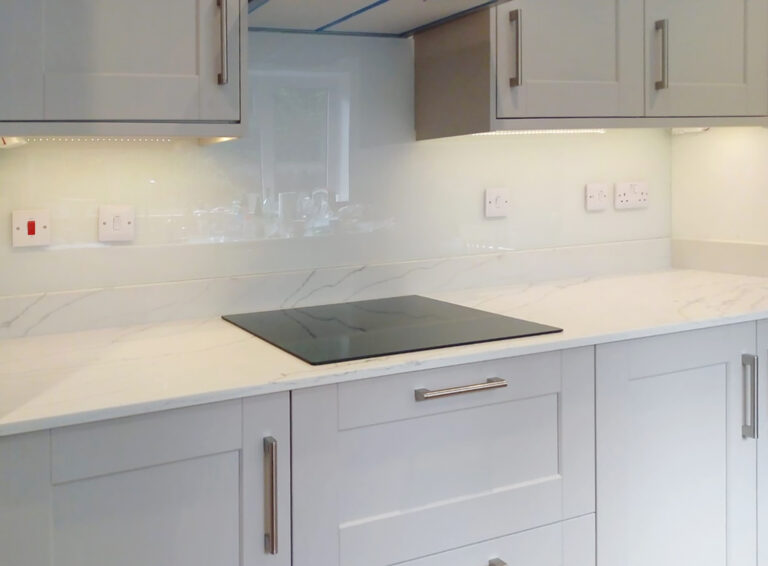
Want to tackle your new kitchen splashback as a DIY project? Here are creative tile ideas made for meticulous homeowners:
Geometric Patterns – Use mosaic tiles to create geometric shapes like chevrons on your kitchen walls. Plan a layout before adhering tiles.
Trendy Subway Tile – Classic white subway tile never goes out of style. Think about fun patterns or hexagon layouts.
Focal Point Medallions – Make a bold statement by framing handmade ceramic or carved tile medallions with neutral field tile.
Mix and Match – Combine materials like wood plank tiles with complementary ceramic. Mix up colours and patterns.
Dimensional Tiles – 3D patterned tiles add shadows and texture. Use sculpted ceramic tile or install typical tile in a brick pattern.
Careful prep and layout planning are key to achieving tile designs that wow. Watch online tutorials for installation tips.
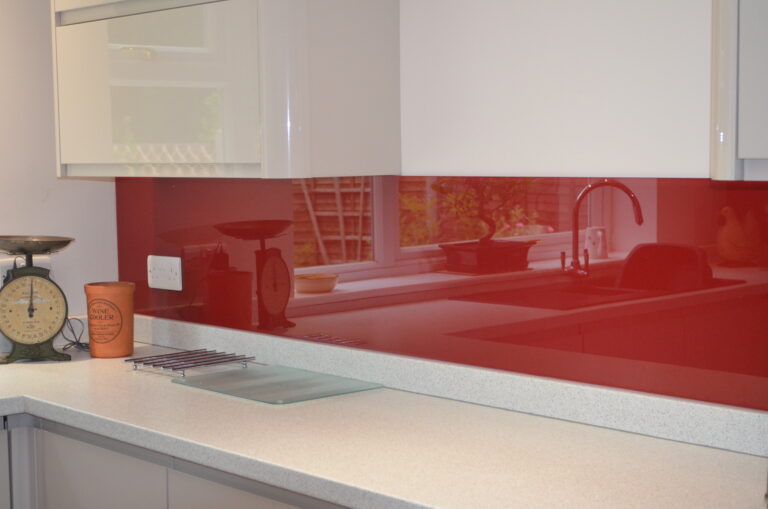
Don’t let splashback sticker shock deter you. Here are cost-conscious solutions:
Peel-and-Stick Film – Affordable and easy to apply right over existing tile or drywall. Cuts custom sizing. Limited durability.
Remnants – Ask tile/glass suppliers for remnant pieces to snag a deal. Great for small spaces.
Contact Paper – Sheets easily adhere to walls for instant transformation. Measure precisely for clean results.
Paint – Buy specialty acrylic paint for a slick DIY splash-proof wall. Use proper primer and several coats.
Laminate – Affordable, customisable laminate kits install quickly. Cut costs by doing it yourself.
Get designer looks on a budget by shopping sales, using contact paper, or painting. Just be mindful of durability.
Narrowing your choices comes down to three key considerations:
Budget – Set realistic expectations for materials and professional vs. DIY installation costs.
Style – Let the aesthetics of your dream kitchen determine suitable styles from sleek glass to homey wood.
Durability – Assess traffic, moisture levels and cleaning habits. Prioritise resilient finishes in high use areas.
Beyond the material itself, smart extras include accent lighting to highlight the splashback and strategic placement of floating shelves or artwork to complement the new focal feature.
Peel-and-stick splashbacks offer an affordable, DIY-friendly option, but are they suitable for kitchens? Considerations include:
Pros:
– Inexpensive material and easy self-installation
– Many colours and patterns available
– Can apply over existing kitchen surfaces
– Peels off easily for modifications
Cons:
– Not as durable long-term compared to tile or glass
– Prone to lifting around the edges over time
– Limiting colour and pattern options compared to tile
– Smoothing bubbles/creases takes skill
Weigh convenience versus longevity. For a rental or temporary upgrade, peel-and-stick works well. For lifelong performance, choose durable glass or tile if budget allows.
Painted wall, laminate sheets, peel-and-stick and tiles made from affordable material like plastic are the most budget-friendly splashback options.
Moisture-resistant glass, tile, and stainless steel withstand humidity best. Use waterproof grout and sealants. Avoid permeable wood or drywall.
Yes, peel-and-stick is a good temporary solution for renters that can easily be removed intact when moving out. Just ensure no damage to existing surfaces.
Do it yourself following online guides, use affordable tile material like plastic, buy remnants and end pieces, or create a simple pattern with large format tiles requiring fewer cuts.
The industry standard is 4 inches above the counter, but for more protection and design impact, consider splashbacks spanning the entire wall behind sinks, stoves, and prep areas.
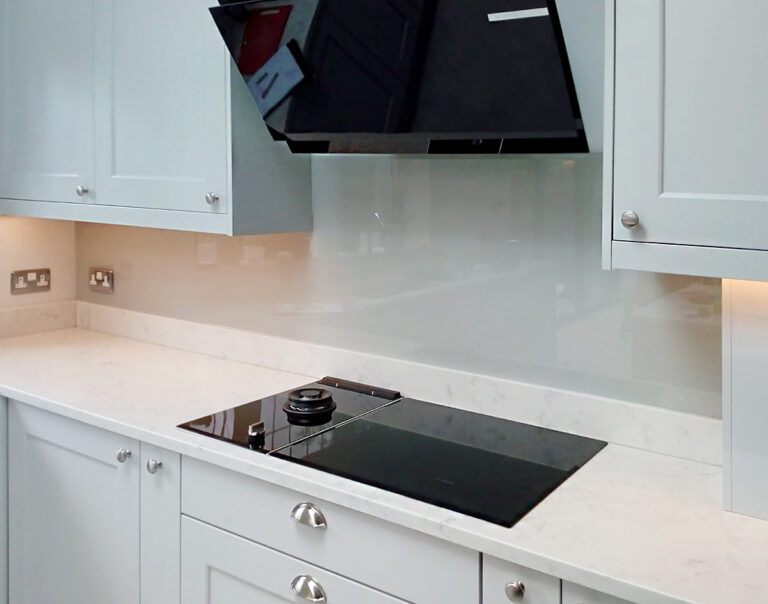
After reading this guide, you have all the tools to choose the perfect kitchen splashback. Take stock of your space, assess priorities like budget and style, get inspired by the possibilities, and make a decision suited for your needs.
The end result will amplify your kitchen’s beauty while offering essential protection from the hustle and bustle of daily cooking. Create a focal point you’ll love!
One of our team would be happy to have a chat with you about your requirements, answer any unanswered questions and measure up at a time that suits you to provide you a free, no obligation quote.
Sheerwater Glass provides window installation and repairs throughout Surrey and the surrounding areas of our Woking showroom. If you’re interested in our services, we encourage you to check if we serve customers in your area by simply typing in your postcode.
If you check and find that we don’t serve customers in your area, in some cases, we may be able to help. Please call us to find out more.